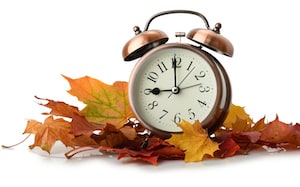Time to Adjust to Daylight Savings
 Whether you like or dislike daylight saving time (DST), here are some interesting facts about DST:
Whether you like or dislike daylight saving time (DST), here are some interesting facts about DST:
- DST is actually called daylight saving time, not savings.
- Ben Franklin was an early advocate of changing the clocks.
- Contrary to common belief, farmers did not lobby for daylight saving time.
- DTS starts at 2pm versus midnight as most shift workers are home and bars/restaurants are closed.
- Arizona and Hawaii do not participate in DST.
- DST may actually be an energy waster instead of saver.
- DTS negatively affects night owls more than morning people.
- The candy industry lobbied for an extended DST to include Halloween
Many people think that Fall’s daylight saving time means an extra hour of sleep. Actually, many people do not or cannot take advantage of the extra hour of sleep, which often results in a disrupted sleep cycle for several days.
Deadly Car CrashesAccording to Popular Science, the single hour of lost sleep in the switch to DST increases the fatal crash rate in the U.S. by a calculated 5.4 to 7.6 percent for a full six days following the transition. Fall time change means fewer daylight hours. Motorist are tired and drowsy. Motorist often have difficulty seeing children playing or riding bicycles, or dog walkers, joggers or pedestrians in the early evenings. The time change impacts drivers of all types of motor vehicles including cars, trucks, lift truck and crane operators and airplane pilots.
Work Place InjuriesA lack of sleep, even an hour loss during DST, can affect one’s motor skills. Research shows that the Monday following DST sees an increase of 5.7 percent in workplace injuries. Many of these injuries are severe. DST also leads to an increase in lost work time and more lost workdays to injuries. DST greatly impacts shift workers, especially those that operate equipment, vehicles and lifting devices.
Adverse Health EffectsDaylight Saving Time also impacts one’s heath. DST affects natural body rhythm leading to an increase in heart attacks and strokes. The University of Alabama showed a 10% increase in the prevalence of heart attacks and an 8% risk increase in stokes in the days following a time change in 2012. During this time people also may display irritability, anxiety and depression.
How to Adjust to DSTThere are things you can do to help you transition to DST. Start adjusting your sleep and waking time prior to the actual time change. Give yourself extra time in the morning. The biggest mistake most people make is thinking they are getting an extra hour of sleep. Short naps are okay but longer naps will most likely throw off your sleep timing. Avoid alcohol and caffeine in the afternoon and evenings. Get as much exposure to sunlight or artificial light as possible in the morning and early evenings as this can help your body synchronize with the new sleep schedule. About an hour before bedtime, dim the lights and slow down. Avoid driving if you are sleep deprived and find alternative transportation. Always remain vigilant when driving on the roadways. Try to keep things as close to normal as possible (stay with routines) like waking and bedtime times, eating, social and exercise times.
Have a happy and safe fall.
 Kalis, Kleiman & Wolfe Home
Kalis, Kleiman & Wolfe Home









